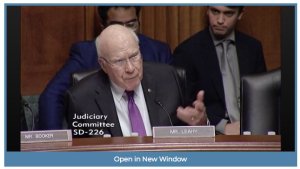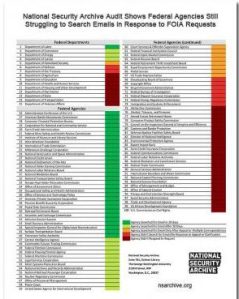Sen. Grassley Sums-Up Sunshine Week Sentiment, Says FOIA Posting Delays Don’t “Meet the Common-Sense Test”: FRINFORMSUM 3/15/2018
OIP’s Position Doesn’t Pass the “Common-Sense Test”
This week the Senate Judiciary Committee held a hearing on “The Freedom of Information Act: Examining the Administration’s Progress on Reforms and Looking Ahead.” The hearing consisted of one panel, all government witnesses – the Justice Department Office of Information Policy’s Melanie Pustay, the Office of Government Information Services Alina Semo, and the Government Accountability Office’s David Powner.
Pustay, predictably, reiterated OIP’s misleading FOIA statistics – citing a 90% release rate even though this number excludes a large swath of requests that are not processed for disclosure because the requests were denied for anything from fee reasons to referrals, and counts the release of merely one word as “a partial release.” Pustay also touted the newly unveiled- FOIA portal, although didn’t address the need for the portal to improve the processing of FOIA requests on the back end to live up to its potential.

Senator Leahy expresses disbelief at OIP’s insistence that 508 should hold up posting documents online.
Most of the eyebrow-raising moments came during the question and answer period, which saw senators underwhelmed by Pustay’s responses to their questions. At one point Senator Grassley told Pustay that her explanation for why the “release to one, release to all” policy had yet to be finalized (Pustay said “agencies have concerns about the time and resources it would take to properly code and upload documents online after a single request”) didn’t pass “the common-sense test.”
Pustay later dug in her heels by saying 508 compliance concerns – a section of the Rehabilitation Act that has required agencies to ensure that persons with disabilities have comparable access to government information as persons without disabilities since 1998 – were a valid reason for agencies to hesitate posting documents online.
Senator Patrick Leahy disagreed, and failed to see how posting an OCR’d version of a PDF wasn’t a better alternative than posting nothing at all. The FOIA Federal Advisory Committee recommends that, instead of either not posting documents or even removing previously posted documents, agencies “remediate documents that are not currently 508 compliant—documents that have optical character recognition are also much easier for all individuals to search through and utilize,” and “ensure that their FOIA reading rooms include contact information that individuals with disabilities can use if they encounter inaccessible documents.”
Leahy also pushed back on Pustay’s claims that OIP has robust FOIA training and guidance program; saying “I don’t care about the robust training. The word robust has become the biggest misused cliché in government.”
GAO’s David Powner had an excellent observation towards the end of the hearing, particularly in light of OIP’s seeming ongoing unwillingness to compel agencies to follow the law. Powner told the committee that “If you don’t have the backing of the [Executive Office of the President] and the Office of Management and Budget, it’s very hard to get the right openness and progress moving the ball forward.”
 NSArchive FOIA Audit Shows Agencies Struggling to Respond to FOIA Requests for Email
NSArchive FOIA Audit Shows Agencies Struggling to Respond to FOIA Requests for Email
Two out of five federal agencies claimed that they were either unable or not required to respond to a targeted Freedom of Information Act (FOIA) request for agency emails submitted by the National Security Archive. The responses to the Archive’s FOIA request show that a year after agencies were required to manage email electronically, FOIA requesters are often not seeing the benefit of any improved email management.
The Archive’s Audit team filed the same FOIA request with all 100 federal agency FOIA offices that are required to submit an annual FOIA report to the Department of Justice’s Office of Information Policy. The request sought all emails received between January 20, 2017, through April 28, 2017, from any Republican National Committee domain, including but not limited to rnchq.org. The Archive wanted to see which agencies were receiving emails from rnchq.org email accounts in light of reporting that prominent members of President Trump’s administration were inappropriately using their RNC email accounts rather than their White House addresses.
Check out the posting at the National Security Archive for the audit results.
GAO Report: Agency FOIA Shops Need to Take Additional Steps
A recent Government Accountability Office (GAO) report, “Agencies Are Implementing Requirements but Need to Take Additional Actions,” analyzed the extent to which 18 federal agencies have implemented six FOIA requirements. Specifically, GAO looked for whether the agencies had 1) updated response letters to inform requesters of the right to seek assistance from FOIA public liaisons, 2) implemented request tracking systems, 3) provided training to FOIA personnel, 4) provided online access to records, including frequently requested records, 5) designated chief FOIA officers, and 6) published updated FOIA regulations as required by the 2016 FOIA Improvement Act.
GAO found six agencies have yet to appoint a chief FOIA officer and only five had updated their FOIA regulations, noting that “Until these agencies address all of the requirements, they increase the risk that the public will lack information that ensures transparency and accountability in government operations.”
Regarding agencies’ growing backlogs the report also noted that agencies with the largest backlogs – which the agencies attributed to more and more complicated FOIA requests – that “these agencies lacked plans that described how they intend to implement best practices to reduce backlogs,” going on to say that “Until agencies develop such plans, they will likely continue to struggle to reduce backlogs to a manageable level.”
 Secret Service and White House Win Rosemary Award for Worst in Open Government in 2017
Secret Service and White House Win Rosemary Award for Worst in Open Government in 2017
The Secret Service and the White House have emerged as the dubious winners from the hard-fought competition for the Archive’s infamous Rosemary Award for worst open government performance of 2017.
The Secret Service clinched the 2017 award for its claim that “There is no system for keeping track of Presidential visitors at Mar-a-Lago.” This remarkable assertion was made in an October 4, 2017, court filing during the course of the National Security Archive’s Freedom of Information Act (FOIA) lawsuit seeking the Secret Service’s White House visitor logs, along with Secret Service records of presidential visitors at other Trump properties.
The award, which the Archive began bestowing in 2005, is named after President Nixon’s secretary, Rose Mary Woods, who testified she had inadvertently erased 18 and ½ minutes of a crucial Watergate tape when she stretched to answer the phone with her foot still on the transcription pedal. Previous Rosemary Award “winners” include the CIA, the Treasury Department, the Air Force, the FBI, the Justice Department (twice), and Director of National Intelligence James Clapper.
Read the rest of the posting and a list of runners-up for this uncoveted award here.
Sunshine Week Must-Reads
There have been quite a few good articles published this Sunshine Week on the state of FOIA and open government. A handful of them are:
- USA Today: Trump administration unfurls a veil of secrecy
- AP: US sets new record for censoring, withholding gov’t files
- Senator Patrick Leahy: The Trump administration’s attack on the people’s right to know
- The Washington Post: Sunshine Week brings Trump’s information darkness to light
- Open the Government: Closing Democracy’s Window: The Growing Culture of Secrecy in Washington and the Erosion of the Public’s Right to Know
Afghan War Info Released
The Special Inspector General for Afghanistan Reconstruction (SIGAR) recently published an addendum to its January report to Congress that provides the information that was withheld from the January report at the order of the Defense Department. Steve Aftergood notes that “The basic thrust of the new data is that Afghan government control of the country is at its lowest reported level since December 2015, while insurgency control is at its highest.”
Earlier this year the DOD ordered SIGAR not to publish the data – that was marked unclassified – on the war in Afghanistan, a move SIGAR called “troubling.” The DOD reversed course shortly after.
Air Force Secrecy
Defense News reports that the Air Force is restricting press access in a move the agency says is necessary for operational security; specifically the Air Force is “slashing access to media embeds, base visits and interviews as it seeks to put the entire public affairs apparatus through retraining.” The change was announced in a March 1 guidance and is the third such Defense Department guidance in the last 18 months to restrict communications with the public and “creates a massive information bureaucracy in which even the most benign human-interest stories must be cleared at the four-star command level.”
Prior to the release of the guidance the Air Force considered shutting down all press communications for 120 days.
Rep. Mike Gallagher, R-Wis., disagrees with the transparency backslide, saying “the department has it backwards. It is precisely because of the scale of the challenges before us that transparency is more important than ever. I worry that by failing to discuss problems, we will only ensure there is no public pressure to fix them.”
TBT Pick – CIA IG Report Exposes Torture as US Policy
This week’s #TBT pick is chosen with the nomination of Gina Haspel as the new CIA director (pending Senate confirmation) to replace Mike Pompeo in mind. Haspel, as outlined by the Archive’s John Prados, was involved in the agency’s torture program at a black site prison and in the destruction of evidence of waterboarding Abu Zubaydah. This week’s TBT pick is a 2009 posting – a side-by-side comparison of two very different versions of a 2004 report on the CIA’s “Counterterrorism Detention and Interrogation Activities” by Agency Inspector General John Helgerson; one released in 208 by the Bush administration and the other by the Obama administration in 2009. New revelations from the 2009 release include:
- Details on a number of “specific unauthorized or undocumented torture techniques” not mentioned in the 2008 release, including the use of guns, drills, threats, smoke, extreme cold, stress positions, “stiff brush and shackles,” mock executions and “hard takedown.”
- A look at the legal reasoning behind the Agency’s use of “enhanced interrogation techniques” and the development of Agency guidance on capture, detention and interrogation.
- A brief discussion of the history of CIA interrogation, including the “resurgence of interest in teaching interrogation techniques” in the early 1980s “as one of several methods to foster foreign liaison relationships.”
Sign Up
Want to stay on top of the latest FOIA news? Click here to sign up for our weekly FRINFORMSUM (Freedom of Information Summary) email newsletter.


Trackbacks
Comments are closed.